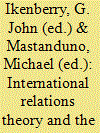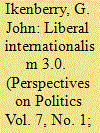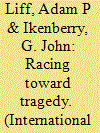|
|
|
Sort Order |
|
|
|
Items / Page
|
|
|
|
|
|
|
| Srl | Item |
| 1 |
ID:
046883


|
|
|
|
|
| Publication |
Princeton, Princeton University Press, 2001.
|
| Description |
xiii, 293p.
|
| Standard Number |
0691050910
|
|
|
|
|
|
|
|
|
|
|
|
Copies: C:1/I:0,R:0,Q:0
Circulation
| Accession# | Call# | Current Location | Status | Policy | Location |
| 046698 | 327.1/IKE 046698 | Main | On Shelf | General | |
|
|
|
|
| 2 |
ID:
050245


|
|
|
|
|
| Publication |
New York, Columbia University Press, 2003.
|
| Description |
vi, 450p.
|
| Standard Number |
0231125917
|
|
|
|
|
|
|
|
|
|
|
|
Copies: C:1/I:0,R:0,Q:0
Circulation
| Accession# | Call# | Current Location | Status | Policy | Location |
| 047578 | 327.095/IKE 047578 | Main | On Shelf | General | |
|
|
|
|
| 3 |
ID:
090678


|
|
|
|
|
| Publication |
2009.
|
| Summary/Abstract |
Liberal international order-both its ideas and real-world political formations-is not embodied in a fixed set of principles or practices. Open markets, international institutions, cooperative security, democratic community, progressive change, collective problem solving, the rule of law-these are aspects of the liberal vision that have made appearances in various combinations and changing ways over the last century. I argue that it is possible to identify three versions or models of liberal international order-versions 1.0, 2.0, and 3.0. The first is associated with the ideas of Woodrow Wilson, the second is the Cold War liberal internationalism of the post-1945 decades, and the third version is a sort of post-hegemonic liberal internationalism that has only partially appeared and whose full shape and logic is still uncertain. I develop a set of dimensions that allow for identifying different logics of liberal international order and identify variables that will shape the movement from liberal internationalism 2.0 to 3.0.
|
|
|
|
|
|
|
|
|
|
|
|
|
|
|
|
| 4 |
ID:
135331


|
|
|
|
|
| Summary/Abstract |
In the post–Cold War period, scholars have considered the Asia Pacific to be ripe for military competition and conflict. Developments over the past decade have deepened these expectations. Across the region, rising military spending and efforts of various states to bolster their military capabilities appear to have created an increasingly volatile climate, along with potentially vicious cycles of mutual arming and rearming. In this context, claims that China's rapid economic growth and surging military spending are fomenting destabilizing arms races and security dilemmas are widespread. Such claims make for catchy headlines, yet they are rarely subject to rigorous empirical tests. Whether patterns of military competition in the Asia Pacific are in fact attributable to a security dilemma–based logic has important implications for international relations theory and foreign policy. The answer has direct consequences for how leaders can maximize the likelihood that peace and stability will prevail in this economically and strategically vital region. A systematic empirical test derived from influential theoretical scholarship on the security dilemma concept assesses the drivers of bilateral and multilateral frictions and military competition under way in the Asia Pacific. Security dilemma–driven competition appears to be an important contributor, yet the outcome is not structurally determined. Although this military competition could grow significantly in the near future, there are a number of available measures that could help to ameliorate or manage some of its worst aspects.
|
|
|
|
|
|
|
|
|
|
|
|
|
|
|
|
|
|
|
|
|